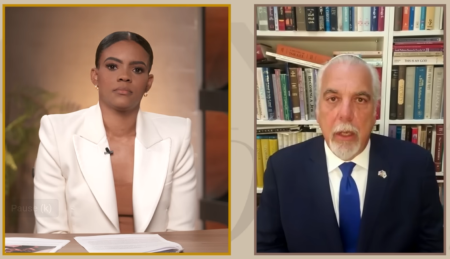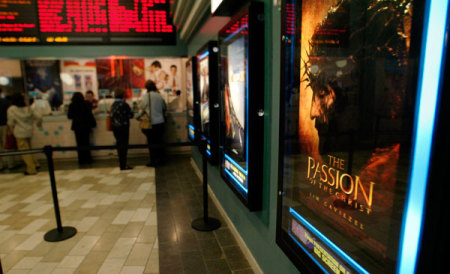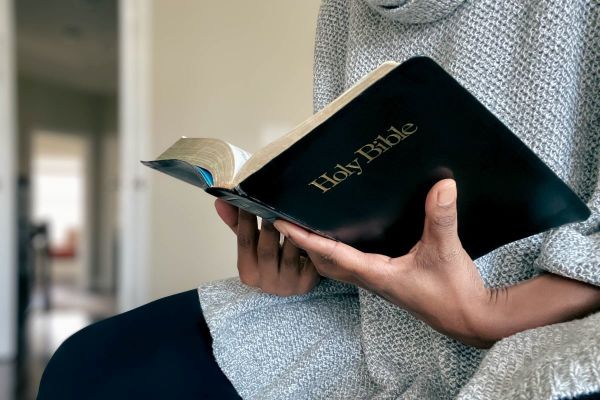Rabbi slams Candace Owens for remark on Jewish 'gangs' controlling Hollywood

A California rabbi who referred to conservative political commentator Candace Owens as an “antisemitic Jew hater” for her comments on the Hamas invasion of Israel last year said a seminal film on the crucifixion of Christ could be seen as antisemitic for those who don’t identify as Christians.
Rabbi Michael Barclay appeared on Owens' podcast on March 18 after he wrote an editorial for conservative outlet PJ Media — which was later retracted — in which he referred to Owens as an “anti-Semitic Jew hater” for her response to the Hamas invasion of Israel last year.
The nearly two-hour-long podcast touched on a number of different topics, including the various definitions of antisemitism, Jews and the entertainment industry, and the slaughter of millions of Christians during the Bolshevik Revolution of 1917 in Russia.
Owens, 34, kicked off the conversation by asking Barclay, 60, for a working definition of what specifically constitutes antisemitism.
Barclay cited a definition he attributed to Rabbi Jonathan Sacks, a former member of the British House of Lords, who said antisemitism is the belief that “Jews have no right to exist collectively as Jews with the same rights as other human beings.”
According to Barclay, the origin of this definition stretches all the way back to the time of Jesus in first century Palestine.
“Two thousand years ago, Jews don't accept Jesus as Messiah. For people who do not have faith as the early Christians, as some of them have faith, some of them accept Jesus, but they don't really in their heart … other people who are doing it without faith and there are those who have less faith,” said Barclay.
“The fact that a Jew exists, let alone thrives, is a threat to their faith because how can the Jew not accept Jesus as God and still thrive unless he's associated with the devil? So you start having these myths that are created of the Jew being identified with the opposite of God.”
Barclay then offered a brief history of what’s known as the “blood libel,” which the Anti-Defamation League defines as a centuries-old false allegation that Jews murder Christians — especially Christian children — to use their blood for ritual purposes.
This blood libel accusation, said Barclay, was “ridiculous” because, for one, the Torah prohibits the consumption of blood.
“We’re forbidden from having any meat that has any blood in it,” he explained. “This is a Torah law. We can’t have steak tartar.”
Barclay also pointed to St. Jerome’s translation of the Latin Vulgate in 382 AD, which he said Jerome deliberately mistranslated from the original Hebrew to depict Moses on Mount Sinai as having horns on his head.
In Hebrew, there's no vowels and the person who translates, Saint Jerome, who translates the Vulgate, knows what he's doing is translating wrong,” Barclay said. “He puts down that when Moses comes down from Mount Sinai he has horns, OK?”
“ ... So now, by 1144 you have the antisemitic myth of Jews have horns, and they drink blood, and I know people who've been asked when they went into the Army and other places, ‘Can I see your horns?’ So this still exists today in 2024 throughout America … ”
When Barclay referred to antisemitism as the “oldest hate in the world and the hate that mutates,” Owens interjected by asking whether he believes the “definition of antisemitism can necessarily change.”
“It's not just my belief,” he replied. “It is the commonly accepted understanding in both the Jewish and academic worlds.”
For Barclay, that definition of antisemitic is flexible enough to apply to some — though not all — audiences who watched Mel Gibson’s 2004 film, “The Passion of the Christ.”
Referring to “Passion” as a “wonderful movie,” Barclay said he saw the film twice and arranged a screening for students during his time as a professor at Loyola Marymount University’s School of Theological Studies, a private Jesuit and Marymount research university in Los Angeles.

But one thing he said he noticed was that audiences were actually watching “two movies” — one of which could be viewed as “antisemitic.”
“If you accept Jesus as your Savior, then that movie is so brilliant and so painful about His suffering that it transcends everything else, and that's all you see,” he said. “ ... If you don't accept Jesus as your Savior, you're not so emotionally attached to all the suffering that Gibson portrays so well. And so, what you do notice, as an example, are all the antisemitic things.”
He gave one example of a scene from “Passion” in which Satan and his demons, in the form of human children, torment Judas for betraying Jesus.
"They're wearing modern 20th century yarmulkes and they have classic Jewish stereotypical faces,” said Barclay. “They morph into demons and with modern yarmulkes.
"It's that trope of Jews as demons.”
He recalled pointing out that imagery to a colleague at LMU who didn’t recall watching the scene as part of the movie — which Barclay said was due to the audience being “so emotionally involved” in Jesus’ crucifixion.
“I realized in that moment, she was so emotionally involved in the suffering of Jesus, she didn't notice the antisemitism,” said Barclay, “but both are true.”
Barclay brought the conversation full circle when he and Owens began a tense exchange over their preferred definitions of “genocide versus the Holocaust” and Barclay brought up comments Owens made earlier this month alluding to Jewish “gangs” controlling Hollywood.
Comparing the backlash to mainstream media’s coverage of street gangs being conflated with the black community in general, Owens said, “What if that is what is happening right now in Hollywood? If there is just a very small ring of specific people who are using the fact that they are Jewish to shield themselves from any criticism?”
Barclay said Owens' comments were another example of an “antisemitic trope” concerning Jews and their history in the entertainment industry, a line of work Barclay said they pursued because they were excluded from other industries at the time.
“For many decades, you were told, ‘Oh, the Jews control Hollywood, this secret cabal and they control Hollywood,’” he said, telling Owens, “You perpetuated that again …
“The reality is that Jews don’t control Hollywood. There may be many executives who are Jews, but that doesn't mean that they are anything other than Jew in name only. They go to temple twice a year, you and I both know Christians like that.”
After accusing Owens of perpetuating an “antisemitic trope that is almost a century old,” Barclay suggested she should have instead specifically called out “some bad guys who are doing bad things” rather than “talking about … the Jews controlling Hollywood.”
In response, Owens denied making such a statement and shared a screengrab of a Dec. 19, 2008, article from reporter Joel Stein of the Los Angeles Times with the headline, “Who runs Hollywood? C’mon”.
The article led with a then-recent survey which found only 22% of Americans believe “the movie and television industries are pretty much run by Jews,” sharply down from nearly 50% in 1964.
“That was published in the LA Times a couple of years ago where a Jewish man wrote, ‘Let's face it we do run Hollywood’,” said Owens. “That was totally fine a couple of years ago.
“Maybe he's antisemitic, though.”
Last October, following Hamas’ attacks on Israel and ensuing airstrikes on Gaza — one of which killed 18 people taking shelter inside the Greek Orthodox Church of Saint Porphyrios — Owens faced backlash for urging Christians to “speak up” about the bombing.
"I have been disgusted by the propagandists pretending a Christian church was not bombed," Owens wrote on X, the platform formerly known as Twitter. "Christians were killed. No Christian should stay silent."
In response to a user who suggested her comment about the Gaza church was antisemitic, Owens wrote, "Respectfully, if you think it’s antisemitism to notice that innocent Christians were killed in an IDF bombing then you need to log off of the internet and have your brain examined. Respectfully."
Ian M. Giatti is a reporter for The Christian Post and the author of BACKWARDS DAD: a children's book for grownups. He can be reached at: ian.giatti@christianpost.com.





















